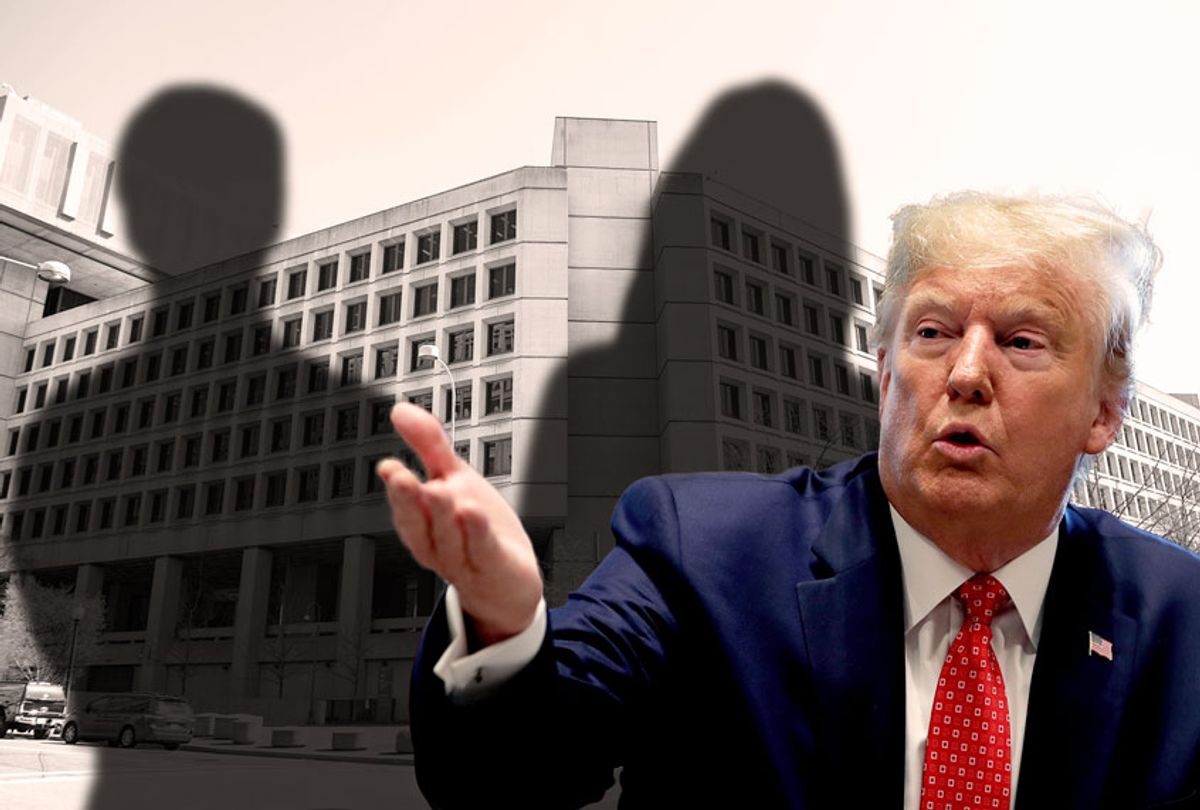The FBI has reportedly asked to interview the whistleblower whose complaint to the intelligence community set off the impeachment investigation into President Donald Trump, multiple news outlets reported Wednesday.
The whistleblower has not yet agreed to an interview.
The FBI request was first reported by Yahoo News, which said that some FBI officials were frustrated that the Justice Department declined to investigate "potential counterintelligence issues" raised in the whistleblower's complaint.
DOJ officials reportedly examined the whistleblower's complaint and decided against opening an investigation by the FBI into the issues it raises. Officials reportedly investigated the question of whether the president violated campaign finance laws and determined that he had not. But other issues raised in the complaint, including bribery and extortion, were not probed.
The whistleblower was not on the now-infamous July 25 phone call between Trump and Ukrainian President Volodymyr Zelensky, which is at the heart of the impeachment inquiry. During that call, Trump pressured Zelensky to commit publicly to investigations that would benefit him politically.
The whistleblower raised concerns about the July 25 call between Trump and Zelensky in a written complaint to the intelligence community's inspector general. The complaint, released publicly in September, ultimately sparked the impeachment inquiry as it detailed efforts by Trump and his personal lawyer, Rudy Giuliani, to pressure Ukraine to investigate former Vice President Joe Biden and his son, Hunter, as well as a debunked conspiracy theory about Ukrainian interference in the 2016 election. The whistleblower also alleged that the White House moved to "lock down" all records of the conversation.
The whistleblower did not directly witness any of the key moments in the unfolding Ukraine scandal. The whistleblower reported concerns made by other colleagues on the National Security Council and forwarded them in a written complaint to the inspector general to the intelligence community.
The whistleblower's complaint has since led to the inquiry's central question of a quid pro quo: Did Trump seek to leverage a potential White House meeting and nearly $400 million in military aid approved by Congress to pressure Ukraine into investigating his political rivals?
Because the whistleblower is not a first-hand witness, congressional Democrats have decided they do not need the individual's testimony. As the House Intelligence Committee opened its inquiry to the public last week, the panel's chairman, Rep. Adam Schiff, D-Calif., warned Republicans against disclosing the identity of the whistleblower and vowed to "do everything necessary to protect the whistleblower's identity."
Republicans, on the other hand, have demanded that the anonymous whistleblower be brought in to testify. They have spent weeks questioning the whistleblower's motives and dismissing the account as inaccurate and politically-motivated.
Trump, meanwhile, has sought to discredit the whistleblower. He has tweeted about the anonymous bureaucrat more than 100 times, including on Sunday when he asked: "Where's the Fake Whistleblower?"
"Like every American, I deserve to meet my accuser, especially when this accuser, the so-called 'Whistleblower,' represented a perfect conversation with a foreign leader in a totally inaccurate and fraudulent way," Trump tweeted on Sept. 29.
Trump has sought to cast the whistleblower as someone with a "bias" against him who had worked with Democrats before filing a complaint. Earlier this month, Trump tried to link the whistleblower to his Democratic predecessor, President Barack Obama, as well as former CIA director John Brennan and national security adviser Susan Rice — two of Obama's top advisers.
"There have been stories written about a certain individual — a male — and they say he's the whistleblower," Trump told reporters last month. "If he's the whistleblower, he has no credibility, because he's a Brennan guy, he's a Susan Rice guy, he's an Obama guy. And he hates Trump."
"Now maybe it's not him," he continued. "But if it's him, you guys ought to release the information."
Nearly all of the claims made in the whistleblower's complaint have been corroborated by witnesses testifying in the impeachment inquiry over the past few weeks. Still, Trump and his GOP allies in Congress have repeatedly and strongly denied there was a quid pro quo and instead argued that the president pressed for investigations to "root out corruptions."

Shares